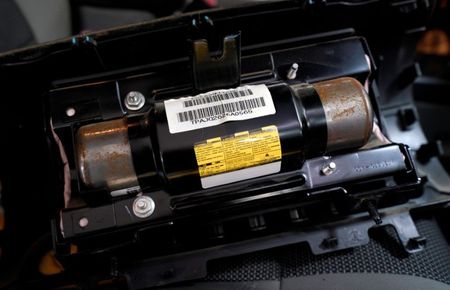
By David Shepardson
WASHINGTON (Reuters) -U.S. auto safety regulators confirmed a fifth Takata air bag inflator crash death in 2022 and reiterated urgent calls for owners to get repairs.
Chrysler-parent Stellantis and the National Highway Traffic Safety Administration said they had confirmed a third Takata air bag inflator death.
Over the last decade, more than 67 million Takata air bag inflators have been recalled in the United States and more than 100 million worldwide, in the biggest auto safety callback in history.
In November, Stellantis urged owners of 276,000 older U.S. vehicles to immediately stop driving after the crash death reports, but just 2,000 owners have gotten repairs since then.
More than 30 deaths worldwide — including 24 U.S. deaths — and hundreds of injuries in various automakers’ vehicles since 2009 are linked to Takata air bag inflators that can explode, unleashing metal shrapnel inside cars and trucks.
The latest death was in a 2010 Chrysler 300, one of three Stellantis deaths in seven months. In July, the owner loaned the vehicle to a family member who was subsequently killed in a crash when the driver-side air bag ruptured on deployment, the company said.
The “Do Not Drive” warning covers Chrysler 300, Dodge Magnum, Challenger and Charger from the 2005 through 2010 model years that have not been repaired.
NHTSA earlier this month confirmed a seventeenth Honda death from a faulty air bag inflator — a February crash that killed the driver of a 2002 Honda Accord in Bowling Green, Kentucky..
Also in November, NHTSA confirmed a new death due to a defective Takata air bag inflator in a 2006 Ford Ranger pickup.
The Takata recalls were spurred by propellant that could break down after long-term exposure to high-temperature fluctuations and humidity.
Stellantis said it made a total of 114 outreach attempts over a seven-year period in the latest fatal incident and has replaced 6.1 million defective inflators and reached out nearly 210 million times using mail, courier service, e-mail, text messages, phone calls and home visits.
(Reporting by David Shepardson, Editing by Louise Heavens)

